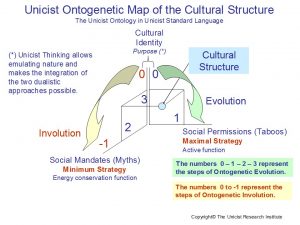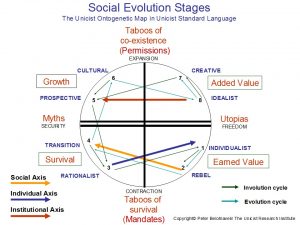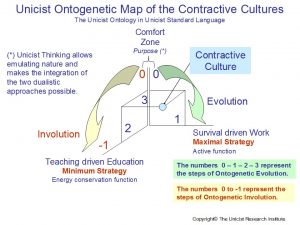The evolution of a culture defines the possibilities for its future generations. That is why individualism has been defined as the lowest level of evolution of a society.
 In evolving societies, individuals approach action based on the cultural identity they have which makes them unique and different from those of other cultures, and act based on the social permissions that are installed in the collective unconsciousness.
In evolving societies, individuals approach action based on the cultural identity they have which makes them unique and different from those of other cultures, and act based on the social permissions that are installed in the collective unconsciousness.
These actions are limited by the social mandates which are materialized in the myths and fallacious myths of a society.
It has to be considered that the social mandates have a different functionality when they sustain the cultural identity to avoid that the use of the social permissions drive towards anarchy. In this case mandates sustain the evolution of the cultural identity.
But they generate involution when they are used as shortcuts in order to avoid the responsibility of assuming the external and internal freedom that is necessary to manage social permissions.
The habits, costumes and ethics of a society define its driver towards evolution or involution. This implies that the driver for evolution or involution is in the costumes, in the automatism of the habits and in the ethics of a culture.
 It has to be considered that ethics is driven by the moral rules which define the mandates of a culture and by an ideology that sustains the functionality of ethics.
It has to be considered that ethics is driven by the moral rules which define the mandates of a culture and by an ideology that sustains the functionality of ethics.
Cultures are always in movement towards expanding or contracting and making trade-offs between the need for freedom and the need for security.
This defines, following the unicist ontology of evolution, four evolving stages and four involving stages.
The evolution of societies requires stabilizing social behavior in order to avoid chaos.
According to the complementation laws there are three axes that establish complementation between the stages: They are the individual axe, the social axe and the institutional axe.
The behavior of a society is driven by three orientations that define the possibilities for evolution or the trend towards involution.
 When we consider the structure of evolution, it can be said that the purpose of a society is to foster social evolution, which means developing action that provide wellbeing to the present generation and establishes the necessary conditions for the future generations.
When we consider the structure of evolution, it can be said that the purpose of a society is to foster social evolution, which means developing action that provide wellbeing to the present generation and establishes the necessary conditions for the future generations.
When we establish the structure of involutionary cultures it will be noticeable that they have no true institutional axe; it is replaced by authoritarian or populist leaders because societies need to find a messiah that assumes the role of the hero to stop the involution and guide the culture towards evolution.
It can be said that cultures evolve if they increase the value they add to an environment and involve when the value diminishes.
This increasing of value or decreasing of value is sustained by the evolution of the ethical intelligence of a culture which drives the change of costumes and habits towards a higher or lower level of social value.
This process happens in cultures in the long run and depends on how they manage the crises they undergo.
 When the causes of the crises are cured, cultures strengthen and develop antibodies for the problem they had. Therefore, when cures are successful, societies become stronger.
When the causes of the crises are cured, cultures strengthen and develop antibodies for the problem they had. Therefore, when cures are successful, societies become stronger.
This produces an upgrade of the culture and fosters its evolution. But cures require paying prices that are frequently avoided. In this case palliatives are applied expecting that the society itself takes advantage of the palliatives and solves the problem it has.
But palliatives generate a new comfort zone that transforms the problem into something that does not need to be avoided.
The successive application of palliatives to a recurrent problem transforms the problem into a chronic weakness of the society and the culture degrades. This generates the involution of a culture.
The drivers for expansive and contractive cultures
The expansion and the contraction of societies depend on the essential values that build the groundings for expansion. Expansion is based on three integrated social objects:
 Overcoming Scarcity: The purpose of an expansive culture is to overcome scarcity. That is why scarcity needs to exist because it drives the final purpose of an expansive attitude. Both abundance and poverty inhibit the existence of an expansive culture.
Overcoming Scarcity: The purpose of an expansive culture is to overcome scarcity. That is why scarcity needs to exist because it drives the final purpose of an expansive attitude. Both abundance and poverty inhibit the existence of an expansive culture.
- Value Adding Work: The active function is given by the value of work in a culture. Cultures are expansive when the concept of work implies the adding of value. This implies that the culture recognizes the value added by work. The value of work is implicitly related with technology, competitiveness and the existence of recognition of the quality and quantity of work delivered by workers.
- Learning driven Education: The support for the achievement of the purpose is given by the educational system that provides the knowledge for a society and establishes the standards for the coming generations. Learning oriented educational systems build the groundings for expansion. They are necessarily driven by the capacity of the learners. That is why they open different possibilities according to the personal capacities of the members of a culture.
Contractive cultures are naturally driven by the existence of a comfort zone sustained both by abundance and/or poverty because of opposite reasons.
 Confort Zone: The main objective is to avoid changing a comfort zone. Contractive cultures generate comfort zones for their members because individuals just need to survive. They cannot imagine influencing the environment in order to change a status quo.
Confort Zone: The main objective is to avoid changing a comfort zone. Contractive cultures generate comfort zones for their members because individuals just need to survive. They cannot imagine influencing the environment in order to change a status quo.
- Survival driven Work: The objective of work is to survive. Contractive cultures cannot accept richness because they consider that it has been produced by appropriating value from others. Technology is a threat and competition a menace. Therefore, they become conservatives in order to sustain what they have.
- Teaching driven Education: The main goal of education in contractive cultures is the socialization and indoctrination of people. This indoctrination frequently integrates both ideological and supernatural values in order to ensure that people follow the leaders. The identification with the victims replaces the solidarity that sustains expansion.

